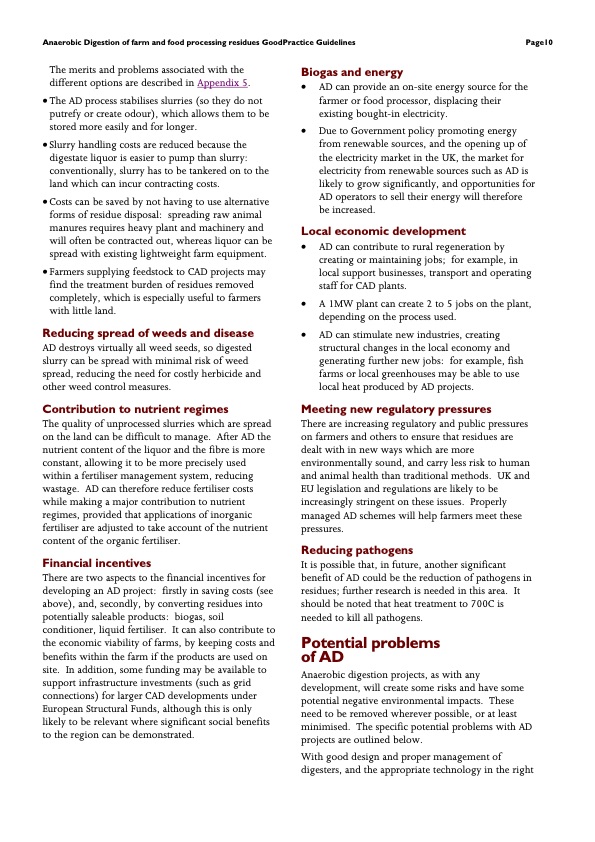
PDF Publication Title:
Text from PDF Page: 011
Anaerobic Digestion of farm and food processing residues GoodPractice Guidelines Page10 The merits and problems associated with the different options are described in Appendix 5. • The AD process stabilises slurries (so they do not putrefy or create odour), which allows them to be stored more easily and for longer. • Slurry handling costs are reduced because the digestate liquor is easier to pump than slurry: conventionally, slurry has to be tankered on to the land which can incur contracting costs. • Costs can be saved by not having to use alternative forms of residue disposal: spreading raw animal manures requires heavy plant and machinery and will often be contracted out, whereas liquor can be spread with existing lightweight farm equipment. • Farmers supplying feedstock to CAD projects may find the treatment burden of residues removed completely, which is especially useful to farmers with little land. Reducing spread of weeds and disease AD destroys virtually all weed seeds, so digested slurry can be spread with minimal risk of weed spread, reducing the need for costly herbicide and other weed control measures. Contribution to nutrient regimes The quality of unprocessed slurries which are spread on the land can be difficult to manage. After AD the nutrient content of the liquor and the fibre is more constant, allowing it to be more precisely used within a fertiliser management system, reducing wastage. AD can therefore reduce fertiliser costs while making a major contribution to nutrient regimes, provided that applications of inorganic fertiliser are adjusted to take account of the nutrient content of the organic fertiliser. Financial incentives There are two aspects to the financial incentives for developing an AD project: firstly in saving costs (see above), and, secondly, by converting residues into potentially saleable products: biogas, soil conditioner, liquid fertiliser. It can also contribute to the economic viability of farms, by keeping costs and benefits within the farm if the products are used on site. In addition, some funding may be available to support infrastructure investments (such as grid connections) for larger CAD developments under European Structural Funds, although this is only likely to be relevant where significant social benefits to the region can be demonstrated. Biogas and energy • AD can provide an on-site energy source for the farmer or food processor, displacing their existing bought-in electricity. • Due to Government policy promoting energy from renewable sources, and the opening up of the electricity market in the UK, the market for electricity from renewable sources such as AD is likely to grow significantly, and opportunities for AD operators to sell their energy will therefore be increased. Local economic development • AD can contribute to rural regeneration by creating or maintaining jobs; for example, in local support businesses, transport and operating staff for CAD plants. • A 1MW plant can create 2 to 5 jobs on the plant, depending on the process used. • AD can stimulate new industries, creating structural changes in the local economy and generating further new jobs: for example, fish farms or local greenhouses may be able to use local heat produced by AD projects. Meeting new regulatory pressures There are increasing regulatory and public pressures on farmers and others to ensure that residues are dealt with in new ways which are more environmentally sound, and carry less risk to human and animal health than traditional methods. UK and EU legislation and regulations are likely to be increasingly stringent on these issues. Properly managed AD schemes will help farmers meet these pressures. Reducing pathogens It is possible that, in future, another significant benefit of AD could be the reduction of pathogens in residues; further research is needed in this area. It should be noted that heat treatment to 700C is needed to kill all pathogens. Potential problems of AD Anaerobic digestion projects, as with any development, will create some risks and have some potential negative environmental impacts. These need to be removed wherever possible, or at least minimised. The specific potential problems with AD projects are outlined below. With good design and proper management of digesters, and the appropriate technology in the rightPDF Image | Anaerobic Digestion Of farm and food Processing residues The development of a sustainable industry

PDF Search Title:
Anaerobic Digestion Of farm and food Processing residues The development of a sustainable industryOriginal File Name Searched:
biogas10.pdfDIY PDF Search: Google It | Yahoo | Bing
Capstone Turbine and Microturbine: Capstone microturbines used and new surplus for sale listing More Info
Consulting and Strategy Services: Need help with Capstone Turbine, sizing systems, applications, or renewable energy strategy, we are here to assist More Info
Container Lumber Dry Kiln: Since 1991 developing and innovating dry kilns using standard shipping containers More Info
Supercritical CO2 Lumber Dry Kiln: Compact fast drying in 3 days or less for small amounts of wood and lumber drying More Info
BitCoin Mining: Bitcoin Mining and Cryptocurrency... More Info
Publications: Capstone Turbine publications for microturbine and distributed energy More Info
FileMaker Software for Renewable Energy Developing database software for the renewable energy industry More Info
CO2 Gas to Liquids On-Demand Production Cart Developing a supercritical CO2 to alcohol on-demand production system (via Nafion reverse fuel cell) More Info
Stranded Gas for low cost power Bitcoin Mining Using stranded gas for generators may provide breakthrough low power costs for cryptocurrency miners. More Info
| CONTACT TEL: 608-238-6001 Email: greg@globalmicroturbine.com | RSS | AMP |